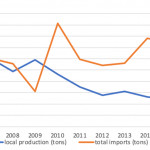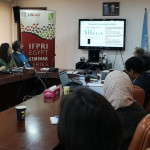Bread prices have long been a sensitive political issue in Egypt. In 1977, President Anwar Sadat cut the subsidies, triggering protests known as the “bread intifada”—ultimately forcing him to roll back his subsidy reform. In 2011, Egyptians took to the... Source: IFPRI Egypt Country Office
NEW PUBLICATION: Food subsidies and cash transfers in Egypt
Evaluating general equilibrium benefits and trade-offs By Clemens Breisinger, Yumna Kassim, Sikandra Kurdi, Josée Randriamamonjy, and James Thurlow Most Egyptians receive food subsidies, which are the cornerstone of the country’s social protection syst... Source: IFPRI Egypt Country Office
In the Land of the Pharaohs, Can Faba Be King Again?
Louise Sarant - independent food security consultant
Three decades ago, Egypt’s Faba bean domestic production suddenly plummeted. A combination of political decisions and environmental changes shattered Egypt’s self-sufficiency in the crop, resulting in today’s heavy reliance on imports. This blog post explores the systemic factors that have contributed to the demise of [...] Source: IFPRI Egypt Country Office
IFPRI EGYPT SEMINAR: “FOOD POLICIES AND THEIR IMPLICATIONS ON OVERWEIGHT AND OBESITY TRENDS IN SELECTED COUNTRIES IN MENA REGION”
Hosam Ibrahim, Kibrom Abay and Lina Abdelfattah - IFPRI Egypt On 14 January 2020 the United Nations Food and Agriculture Organization (FAO) and the International Food Policy Research Institute (IFPRI) hosted a joint seminar, which shed light on the latest trends and distinct patterns of overweight and obesity across the Near East and North Africa […] Source: IFPRI Egypt Country Office
What’s the future of food subsidies in Egypt?
Hoda El-Enbaby and Clemens Breisinger - IFPRI
In Egypt’s current context of wide-ranging economic reforms, there is growing momentum to improve the longstanding Tamween food subsidy system. Tamween’s ration cards benefit around 70 million people, while the bread subsidy benefits around 83 million people, and together they make up about 6 percent of the government’s budget. During a workshop organized by the World Bank under the auspices of the Ministry of Supply and Internal Trade (MoSIT), on May 20th, 2019, Marina Wes (World Bank Country Director for Egypt, Yemen and Djibouti) emphasized the potential expected gains of reforming the subsidy program, and the importance of learning from other countries while contextualizing to Egypt-specific conditions. Source: IFPRI Egypt Country Office



